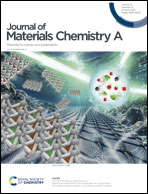A platinum-based photothermal polymer with intermolecular/ligand-to-ligand charge transfer for efficient and sustainable solar-powered desalination†
Abstract
The interfacial solar steam generation (ISSG) system has garnered widespread attention in addressing the global freshwater scarcity issue. Enhancing the performance of the ISSG system relies on the development of highly efficient photothermal materials. We have developed a new platinum-based photothermal polymer, named PffBTPt, which shows excellent sunlight absorption capability through intermolecular and ligand-to-ligand charge transfer mechanisms investigated by DFT calculations. An effective and stable solar evaporator is successfully fabricated by depositing PffBTPt onto a polyurethane foam (PU) substrate. The surface temperature of PffBTPt-attached PU rapidly rises up to nearly its peak value of 66.4 °C within 1 minute under 1 sun due to effective nonradiative transitions, surpassing 36.5 °C of the PU. The solar evaporator exhibits a water evaporation efficiency of 85.6% and an evaporation rate of 1.57 kg m−2 h−1 under 1 sun, as well as achieves a 3–5 order of magnitude reduction in the concentrations of Ca2+, K+, Mg2+, and Na+ after desalination of seawater. In this study, the organometallic photothermal material is reported for the first time, demonstrating its significant potential in simultaneous clean water production and seawater desalination. This research also offers a fresh perspective on the molecular design aimed at creating effective organometallic photothermal polymers by integrating a suitable metal complex into the polymer backbone.

- This article is part of the themed collections: Celebrating International Women’s day 2025: Women in Materials Science and Journal of Materials Chemistry A Emerging Investigators 2024


 Please wait while we load your content...
Please wait while we load your content...